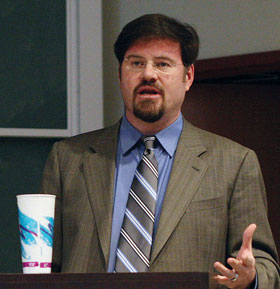Author and National Review magazine contributing editor Jonah Goldberg visited Wabash on Wednesday night to discuss his latest New York Times bestseller, Liberal Fascism. Throughout the lecture, sponsored by The Wabash Conservative Union, Goldberg outlined the main points and assertions in his book, providing examples and citing some of the research footnoted in his book.
 Goldberg described the book as an attempt to demonstrate that American progressives are the intellectual heirs of fascism, not American conservatives. For too long, said Goldberg, conservatives have been labeled as fascist and the word has been used to chastise without any consideration for the historical and intellectual history of the word.
Goldberg described the book as an attempt to demonstrate that American progressives are the intellectual heirs of fascism, not American conservatives. For too long, said Goldberg, conservatives have been labeled as fascist and the word has been used to chastise without any consideration for the historical and intellectual history of the word.
"I’ll be honest," Goldberg said, "part of the reason for me to write this book was because I was tired of being called a fascist." Goldberg explained that the first half of his book is an attempt to place fascism on the left of the political spectrum in America. In none of the critical reviews of the book, he said, has anyone made a coherent intellectual rebuttal to this initial attempt to place fascism on the left side of the political spectrum. The section of the book that there has caused the most rancor and controversy, Goldberg said, was the second half of the book.
The remaining pages of Liberal Fascism are devoted to exploring the links between the fascism of the early twentieth century and modern American progressivism. Goldberg provided numerous examples from his books to support his hypothesis.
During the question and answer period, there was a lively exchange from a variety of questioners, some of whom agreed with Goldberg’s thesis and others who did not. During an answer to one question which had focused on the appropriateness of linking "fascist" with "progressive," Goldberg responded with a hypothetical. Hillary Clinton, he explained, had once been asked what a liberal was during a Youtube.com debate. She had responded liberal had come to mean all these different things and that what she was best described as a modern progressive. Goldberg then suggested that the audience reflect on what the reaction would be if someone like Mike Huckabee were to answer a similar question by saying that since conservatism has come to mean all these things, he is best described as a Confederate. There would be outrage, Goldberg assured the audience, with people claiming that the candidate failed to recognize the historical allusions to American history. Goldberg explained that his hope in writing the book was to make people similarly recognize the intellectual link between fascism and progressivism.
Overall, reaction to the event appeared to be positive. A full reception followed the event in which people stayed to talk amongst themselves or ask additional questions of Goldberg. Some people even asked him to sign posters or copies of his Liberal Fascism book. Adam Brasich ’11, a member of The Wabash Conservative Union was pleased with the event. "I thought he did an excellent job of explaining and defending his positions. He appeared to be very knowledgeable about the subject."
Michael Nossett ’11 agreed and was impressed by Goldberg’s ability to make his case and address criticism.
Steve Hernandez ’09, still had some concerns about the book. "I have done a lot of research on Franco and would have liked to see him address Franco during his lecture." Criticism aside, Hernandez did describe the lecture as overall interesting.